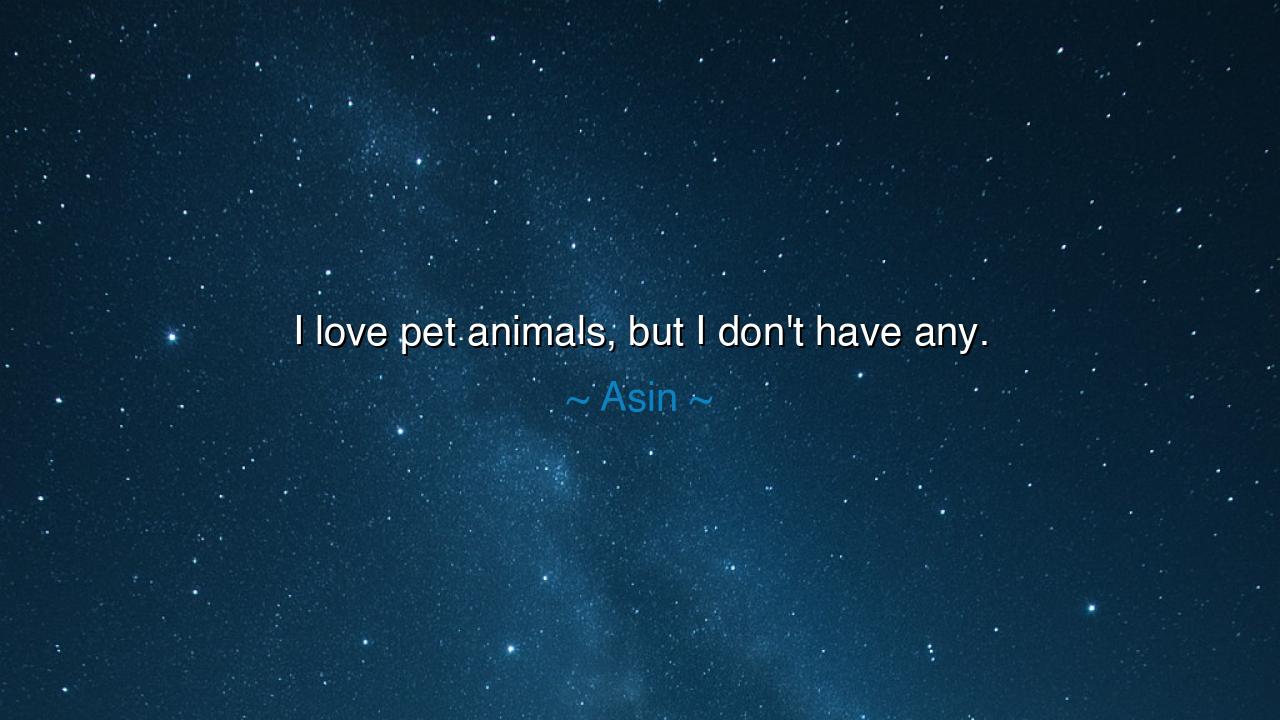
I love pet animals, but I don't have any.






Hear, O children of longing and keepers of compassion, the words of Asin, who said with quiet honesty: “I love pet animals, but I don’t have any.” At first, the words seem simple, a passing remark, yet beneath them flows the deeper current of human desire and restraint, of affection that lives in the heart but does not take the form of possession. It is a confession of both tenderness and limitation, of love that is real even when it remains unfulfilled.
To love pet animals is to open the heart to innocence. For these creatures embody loyalty, joy, and trust without condition. They are the companions of solitude, the guardians of households, the healers of hidden sorrows. When one says, “I love them,” they reveal an affinity for gentleness, for the bond between species, for the silent communion that requires no words. Yet Asin adds the second truth: “but I don’t have any.” Here lies the paradox—that one may feel deep love, yet not claim ownership.
This is not hypocrisy, but wisdom. For to keep a pet is not only to love it, but to shoulder its care, its feeding, its safety, its health. Not every soul, no matter how affectionate, has the time, the stability, or the space to provide such guardianship. To love without possessing may then be the truest humility: to recognize one’s limits, to refrain from binding another creature to a life that may not be well-provided for. In this way, restraint becomes an act of compassion.
Consider, O listener, the story of Mahatma Gandhi, who taught that true love is not possession but service. He spoke of the cow as sacred, yet he did not seek to own her, but to protect her kind. In this, Gandhi revealed the same wisdom as Asin: that love does not demand possession. One may advocate, cherish, and respect from afar, and still the love remains real, perhaps even purer, unburdened by the duties one cannot yet fulfill.
The meaning of Asin’s words is thus: love does not always require ownership. To love animals is not proven only by keeping them in one’s home, but also by respecting them in the wild, supporting their welfare, protecting them from harm, and cherishing their presence in the greater world. The absence of possession does not lessen the presence of love. On the contrary, it teaches that love can be vast, extending beyond walls and leashes.
The lesson for you, O child of tomorrow, is this: do not measure your love by possession, but by compassion. If you have the means, then keep and care for a pet with tenderness and devotion. But if you cannot, let your love take other forms: feed the strays, support shelters, speak against cruelty, and walk gently upon the earth where animals dwell. For love is not diminished by distance—it is revealed in action.
Practical action follows: if you love pet animals yet cannot keep them, volunteer time at a shelter, donate to causes that protect them, or simply offer kindness to those creatures you meet in the streets or in the wild. Teach others, especially the young, to treat animals with respect. For every small act of mercy adds to the greater harmony between humankind and creation.
Therefore, remember Asin’s wisdom: “I love pet animals, but I don’t have any.” In this, we are reminded that true love is not always marked by ownership, but by reverence, respect, and compassion. Let your love be wide enough to embrace not only what you can hold, but also what you must release. For in this, you honor both the creatures and the truth of your own heart.






AAdministratorAdministrator
Welcome, honored guests. Please leave a comment, we will respond soon